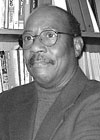Robert Stephens
Professor of World Music
Robert Stephens specializes in world music and music education. He is studying the history of Afro-Cuban music and culture and was awarded a Rockefeller Residency Fellowship in Bellagio, Italy. Stephens has earned graduate degrees from Teachers College, Columbia University, and Indiana University.
It was the sound of Brahms’s 2nd Symphony filling the Savannah Civic Center that inspired Robert Stephens to pursue a career in music education.
“As a high school senior in Georgia, I heard, for the first time, a symphony orchestra. It was one of the most moving experiences I ever had in my life. I chose to go into teaching because somehow I wanted to be able to help others understand what that moment was like,” Stephens says.
Before coming to UConn, Stephens chaired the music department at Montclair State University in New Jersey, where he was also coordinator of the music education program. He received his doctorate in music from Indiana University, with concentrations in ethnomusicology and flute. He received his master of arts and master of education degrees from Columbia University and his bachelor’s degree from Savannah State College in Georgia.
A strong advocate of travel and field experiences for students, Stephens worked towards globalizing the curriculum through exchange programs with other countries. “It gives the students another world view,” he says.
While at Montclair State, he directed Project Southwest, a field-based research and teaching and learning experience on the cultural traditions of Indians on the Hopi Reservation in Second Mesa, Arizona. He also took students on field trips to Ghana, where part of the field study was to do a comparative analysis of Western and African aesthetics. “The world is becoming a global village. Our students are going to have to address these blurring boundaries.”
Since 1998, Stephens has made several more trips to Cuba in search of information that can help him to understand how the culture of the Yoruba has survived in the ceremonial language of Lucumi. Yoruba people made up the majority of Africans transported to Cuba between 1820 and 1840, and more were brought to Matanzas than any other Cuban city. That is where Stephens is focusing his research.
In this quest, Stephens is searching for the language — musical and theological — in which the memories of Yoruba survive. It was those memories that kept the spirits of hundreds of thousands of people alive during one of the darkest chapters in the history of the world.
